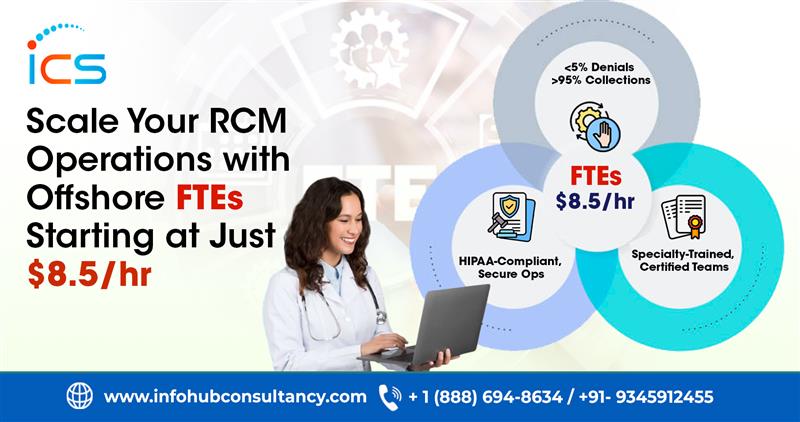Introduction
Medical billing and coding have become increasingly intricate in today’s healthcare landscape. Accurate coding, timely claim submissions, and compliance with constantly changing regulations are essential for maintaining a healthy revenue cycle. However, many practices—especially smaller ones—struggle to manage these tasks efficiently while keeping costs under control.
The primary decision healthcare providers face is whether to handle billing operations in-house or adopt an outsourced Full-Time Equivalent (FTE) model. While the traditional in-house team offers direct oversight, the FTE model provides access to certified professionals at a fraction of the cost. But which approach best suits your practice? Let’s break down the differences and explore why offshore medical billing and coding services are becoming the go-to solution for many healthcare providers.
What is the FTE Model in Medical Billing and Coding?
The Full-Time Equivalent (FTE) model in medical billing and coding involves hiring dedicated professionals through a specialized offshore service provider. Unlike traditional outsourcing, FTE staff work exclusively for your practice, ensuring consistency, accountability, and personalized service.
These professionals handle end-to-end billing functions, from patient demographics entry and coding to payment posting and accounts receivable follow-ups. Practices pay a simple, transparent hourly rate—like the competitive $7.5 per hour offered by Info Hub Consultancy Services—without the overhead of salaries, benefits, and infrastructure.
How Does It Work?
- A dedicated team is assigned to your practice based on workload requirements.
- They work in real-time using your existing billing software.
- Regular performance reports and open communication ensure seamless integration with your operations.
This model transforms medical billing from a complex, resource-heavy task into a streamlined, cost-efficient process.
The In-House Medical Billing Team: A Familiar but Costly Model
Many practices opt for in-house billing teams because of the perceived control and direct communication. However, this traditional approach often comes with hidden costs and operational challenges.
Key Challenges of In-House Billing:
- Hiring and Training Costs: Recruiting skilled billers and coders requires time, money, and ongoing training to stay compliant with industry changes.
- Software Expenses: Medical billing software licenses, updates, and IT support can become significant financial burdens.
- Limited Focus: In-house staff often juggle multiple administrative tasks, reducing their accuracy and productivity in billing processes.
While having an on-site team may offer some operational familiarity, these inefficiencies can lead to delayed payments and increased denial rates—directly impacting the practice’s financial health.
Cost Efficiency: FTE Model vs. In-House Staff
Cost savings are often the most compelling reason healthcare practices switch to the FTE model. Let’s compare the typical expenses:
| Cost Component | In-House Team | FTE Model |
| Salaries (Coder/Biller) | $25-$30/hour | $7.5/hour |
| Training & Certifications | $2,000+ per staff/year | Included |
| Software Licenses | $5,000+ annually | Covered by offshore team |
| Infrastructure (Workstations, IT) | $3,000+ annually | No additional costs |
| Turnover & Rehiring Expenses | High in the current job market | None – managed by service provider |
By adopting the FTE model, small practices typically reduce their medical billing costs by 30-40%, reallocating resources to patient care and practice growth.
Performance and Accuracy in Medical Billing
Medical billing is unforgiving—minor errors can lead to claim denials, delayed reimbursements, and potential compliance penalties. FTE professionals focus exclusively on billing tasks, ensuring greater accuracy and efficiency.
Certified coders stay updated with ICD-10, CPT, and HCPCS code changes, reducing the likelihood of claim rejections. In-house teams, on the other hand, often balance multiple roles, increasing the risk of overlooked details and coding mistakes.
Key Performance Advantages of the FTE Model:
- Faster claims processing due to task specialization
- Lower denial rates thanks to meticulous coding practices
- Proactive denial management and follow-ups to secure timely reimbursements
Scalability and Flexibility in Billing Operations
Healthcare practices rarely experience static patient volumes. Seasonal fluctuations, changing service lines, and growth initiatives demand flexible staffing models. The FTE model offers unmatched scalability by adjusting team sizes based on workload demands.
FTE Model:
- Easy to add or reduce team members without recruitment hassles
- Adjust billing capacity during peak periods (e.g., flu season)
In-House Team:
- Requires lengthy hiring and training processes for expansion
- Risk of underutilized staff during slower periods
Technology and Compliance Management
Billing regulations evolve constantly, with frequent updates from CMS, HIPAA requirements, and payer-specific guidelines. Staying compliant demands continuous education and investment in modern billing software.
FTE teams from established offshore medical billing and coding companies receive regular training and use industry-leading software like NextGen, eClinicalWorks, and Kareo. By contrast, in-house teams often fall behind on updates due to time constraints and resource limitations.
Case Study: How Dr. Thompson’s Family Practice Boosted Revenue with the FTE Model
The Challenge:
Dr. Sarah Thompson, who runs a small family practice, struggled with delayed payments and rising administrative costs. Her in-house team faced frequent coding errors, contributing to a 25% denial rate and a 40% increase in unpaid claims over 12 months.
The Solution:
She partnered with Info Hub Consultancy Services to adopt the FTE Model in Medical Billing and Coding. A team of certified billers, trained in orthopedic and family medicine coding, was assigned to her practice at $7.5 per hour.
The Results (in 6 months):
- Revenue Growth: 35% increase in collections
- Improved Accuracy: Denial rate dropped to 7%
- Cost Savings: 40% reduction in operational expenses
Dr. Thompson now enjoys a streamlined billing process and can focus more on her patients while trusting the ICS team to manage her revenue cycle.
Why the FTE Model is a Smart Move for Small Practices
The FTE model offers distinct advantages for healthcare providers seeking efficiency, accuracy, and cost savings. Here’s why small practices should consider this approach:
- Affordable Pricing: Certified billing experts at just $7.5 per hour.
- Unmatched Expertise: Access professionals experienced in over 40 medical specialties.
- Operational Flexibility: Scale billing operations without recruitment or training hassles.
- Advanced Technology: Utilize cutting-edge billing tools without extra costs.
- Compliance Confidence: Stay aligned with HIPAA, ICD-10, CPT, and payer-specific requirements.
By leveraging offshore medical billing and coding services, practices can enhance their financial performance without compromising on quality.
Conclusion
Choosing the right staffing model for your medical billing operations is more than just a cost decision—it’s a strategic move toward sustainable growth. The Full-Time Equivalent (FTE) Model for Medical Billing and Coding empowers healthcare providers with cost-effective, accurate, and scalable billing services. With certified professionals working as an extension of your practice, you’ll experience improved collections, reduced operational headaches, and greater financial clarity.
As one of the top offshore medical coding and billing services providers in India, Info Hub Consultancy Services delivers tailored FTE solutions designed to meet the unique needs of small and mid-sized healthcare practices. Discover the difference today—contact us at inquiry@infohubconsultancy.com or call +1 (888) 694-8634. Book a free 30-minute consultation and receive a complimentary medical billing audit to identify immediate improvement opportunities.

 6 mins read
6 mins read 








.png)

